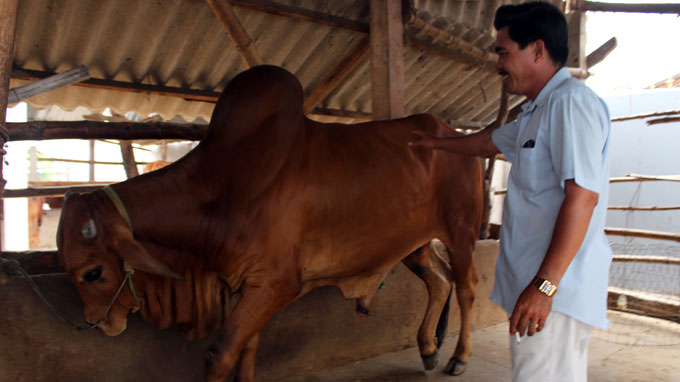To farmers in Ben Tre, a southern province in Vietnam’s Mekong Delta, a cash cow literally means a cow.
Many farmers in the province, about 100km south of Ho Chi Minh City, have generated earnings worth hundreds of millions of dong a year from keeping the cattle, enabling them to have a much better life than what working hard on the traditional paddy fields has to offer these people.
Livestock farmers say raising meat cattle is not a labor-consuming job while requiring low expenses as they can take advantage of the byproducts from rice cultivation and other local produce to feed the animals.
The cows and bulls are mainly fed on rice straws, which are widely available in Ben Tre where a large area of agricultural land is zoned for rice growing.
“Raising cattle is much simpler than poultry as they mostly eat straws, which are easy to find while posing low risks of an epidemic,” said Dang Truong Da, a 57-year-old teacher in Ba Tri District. Da breeds six cows at home and rakes in more than VND100 million (US$4,717) a year by selling their calves.
Most of the cow farmers in Ba Tri have one to three huge piles of straws in their yards and the rice byproducts have become an important source of animal feed.
“Instead of burning straws as in other localities, farmers in Ba Tri keep and sell them as cattle feed,” Nguyen Thi Kim Loan, from the district’s My Chanh Commune, explained.
Loan has sold four bulls of her herd for VND40 million ($1,887) each to afford to build a new house. Of the six animals left, there is a bull weighing around 700kg which Loan still refuses to sell even at a high price of VND47 million ($2,217), she said.
Readily available feed
Besides straws, farmers in Ben Tre also feed their cattle on coconut and the dregs left from alcohol production.
Ben Tre is known as the “coconut kingdom” and home to the Phu Le village, which produces the famed namesake alcohol.
Interestingly enough, the cow manure is also valuable to farmers.
“Instead of treating the waste, we dry it under the sun, pack the substance into bags, and vend them to gardeners in the southern and Central Highlands regions for use as fertilizer at VND10,000 per 10kg,” Loan said, adding that the proceeds from selling the manure is enough to buy straws.
The only considerable expense in raising cattle in Ben Tre is the cost to buy calves. A five- to six-month-old calf now fetches up to VND20 million ($943).
Dozens of thousands of households in Ben Tre have been able to lead a better life by raising cows along with their traditional job of growing rice.
It takes a cow 18 to 20 months to weigh 500kg to 700kg, nearly equal to the imported Australian cattle.
Ben Tre is currently home to the largest cattle herd in the Mekong Delta with 155,000 animals, 43 percent of which are kept in Ba Tri.
Like us on Facebook or follow us on Twitter to get the latest news about Vietnam!




















































